 W
WA certification mark on a commercial product indicates the existence of an accepted product standard or regulation and a claim that the manufacturer has verified compliance with those standards or regulations. The specific specification, test methods, and frequency of testing are published by the standards organization. Certification listing does not necessarily guarantee fitness-for-use. Validation testing, proper usage, and field testing are often needed.
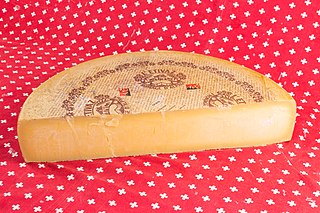 W
WIn Switzerland, the appellation d'origine protégée is a geographical indication protecting the origin and the quality of traditional food products other than wines.
 W
WAsthma & Allergy Friendly is a registered certification mark operated by Allergy Standards Limited in association with not-for-profit asthma and/or allergy organizations, labeling products which have been put through and have passed standardised testing. The Asthma & Allergy Friendly Certification Program was created to scientifically test and identify consumer products that are more suitable for people with asthma and allergies.
 W
WThe BIS hallmark is a hallmarking system for gold as well as silver jewellery sold in India certifying the purity of the metal. It certifies that the piece of jewellery conforms to a set of standards laid by the Bureau of Indian Standards, the national standards organization of India. India is the second biggest market for gold and its jewellery.
 W
WBritish Approvals Service for Cables is an independent accredited certification body headquartered in Milton Keynes, United Kingdom. Here, the organization's dedicated testing laboratory also operates which is believed to be the largest of its type in Europe. BASEC was established in 1971 and principally provides product certification services for all types of cable and wire, ancillary products and management systems within the cable industry. The organization maintains operations throughout the world including Africa, Middle East, America, Asia and Europe.
 W
WBritish Standards (BS) are the standards produced by the BSI Group which is incorporated under a royal charter. The BSI Group produces British Standards under the authority of the charter, which lays down as one of the BSI's objectives to:Set up standards of quality for goods and services, and prepare and promote the general adoption of British Standards and schedules in connection therewith and from time to time to revise, alter and amend such standards and schedules as experience and circumstances require.
 W
WThe British Standards Institution (BSI) is the national standards body of the United Kingdom. BSI produces technical standards on a wide range of products and services and also supplies certification and standards-related services to businesses.
 W
WCE marking is an administrative marking with which the manufacturer or importer affirms its conformity with European health, safety, and environmental protection standards for products sold within the European Economic Area (EEA). It is not a quality indicator or a certification mark. The CE marking is also found on products sold outside the EEA that have been manufactured to EEA standards. This makes the CE marking recognizable worldwide even to people who are not familiar with the European Economic Area.
 W
WCEBEC is a private Belgian rating label for the quality assurance of electrical appliances. Use of this label indicates that a piece of equipment conforms to European safety standards. The label is issued by SGS-CEBEC, now part of the SGS group. CEBEC has its own electrical testing laboratory located in Brussels. It is an approved laboratory for the purpose of certifications granted by SGS.
 W
WThe Central Board of Film Certification (CBFC) is a statutory film-certification body in the Ministry of Information and Broadcasting of the Government of India. It is tasked with "regulating the public exhibition of films under the provisions of the Cinematograph Act 1952." Films screened in cinemas and on television may only be publicly exhibited in India after certification by the board.
 W
WThe China Compulsory Certificate mark, commonly known as a CCC Mark, is a compulsory safety mark for many products imported, sold or used in the Chinese market. It was implemented on May 1, 2002 and became fully effective on August 1, 2003.
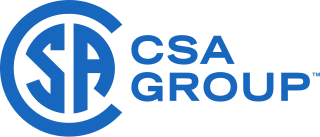 W
WThe CSA Group is a standards organization which develops standards in 57 areas. CSA publishes standards in print and electronic form, and provides training and advisory services. CSA is composed of representatives from industry, government, and consumer groups.
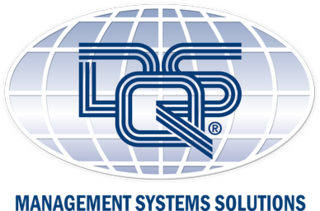 W
WDQS Holding GmbH based in Frankfurt am Main is the holding company of the worldwide DQS Group. The group provides assessments and certifications of management systems and processes of any type.
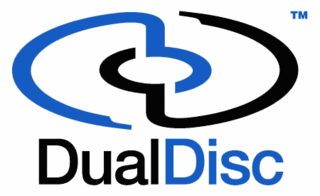 W
WThe DualDisc is a type of double-sided optical disc product developed by a group of record companies including MJJ Productions Inc., EMI Music, Universal Music Group, Sony BMG Music Entertainment, Warner Music Group, and 5.1 Entertainment Group and later under the aegis of the Recording Industry Association of America (RIAA). It featured an audio layer intended to be compatible with CD players on one side and a standard DVD layer on the other. In this respect it was similar to, but distinct from, the DVDplus developed in Europe by Dieter Dierks and covered by European patents.
ENEC is the high quality European mark for electrical products that demonstrates compliance with European safety standards.
 W
WThe EnergyGuide provides consumers in the United States information about the energy consumption, efficiency, and operating costs of appliances and consumer products.
 W
WEnhanced CD is a certification mark of the Recording Industry Association of America for various technologies that combine audio and computer data for use in both Compact Disc and CD-ROM players.
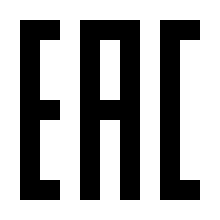 W
WThe Eurasian Conformity mark is a certification mark to indicate products that conform to all technical regulations of the Eurasian Customs Union. It means that the EAC-marked products meet all requirements of the corresponding technical regulations and have passed all conformity assessment procedures.
 W
WThe European Vegetarian Union (EVU) is a non-profit, non-governmental umbrella organisation for vegetarian societies and groups in Europe. The union works in the areas of vegetarianism, nutrition, health, consumer protection, the campaign for animal rights, ecology, general information and against world hunger. Headquarters are in Winterthur (Switzerland), together with the Swiss organisation Swissveg.
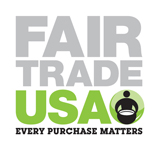 W
WFair Trade USA, formerly "TransFair USA", is a 501(c)(3) non-profit organization that sets standards, certifies, and labels products that promote sustainable livelihoods for farmers and workers and protect the environment.
 W
WThe Fairtrade certification initiative was created to form a new method for economic trade. This method takes an ethical standpoint, and considers the producers first.
 W
WThe FCC logo or the FCC mark is a voluntary mark employed on electronic products manufactured or sold in the United States which indicates that the electromagnetic radiation from the device is below the limits specified by the Federal Communications Commission and the manufacturer has followed the requirements of the Supplier's Declaration of Conformity authorization procedures. The FCC label is found even on products sold outside the US territory, because they are either products manufactured in the US and had been exported, or they are also sold in the US. This makes the FCC label recognizable worldwide even to people to whom the name of the agency is not familiar.
 W
WFM Global is an American mutual insurance company based in Johnston, Rhode Island, United States, with offices worldwide, that specializes in loss prevention services primarily to large corporations throughout the world in the Highly Protected Risk (HPR) property insurance market sector. "FM Global" is the communicative name of the company, whereas the legal name is "Factory Mutual Insurance Company". FM Global has been named the "Best Property Insurer in the World” by Euromoney Magazine.
 W
WThe Geprüfte Sicherheit or GS mark is a voluntary certification mark for technical equipment. It indicates that the equipment meets German and, if available, European safety requirements for such devices. The main difference between GS and CE mark is that the compliance with the European safety requirements has been tested and certified by a state-approved independent body. CE marking, in contrast, is issued for the signing of a declaration that the product is in compliance with European legislation. The GS mark is based on the German Product Safety Act.
 W
WGood Housekeeping is an American women's magazine featuring articles about women's interests, product testing by The Good Housekeeping Institute, recipes, diet, and health, as well as literary articles. It is well known for the "Good Housekeeping Seal", a limited warranty program that is popularly known as the "Good Housekeeping Seal of Approval".
 W
WGulf Conformity mark, also known as G-mark is a certification mark used to indicate products that conform to all technical regulations of the Gulf Cooperation Council. It means that the G-marked products meet all requirements of the corresponding technical regulations and have passed all conformity assessment procedures. The mark was introduced in 2009.
 W
WGuobiao standards or GB standards are the Chinese national standards issued by the Standardization Administration of China (SAC), the Chinese National Committee of the ISO and IEC. GB stands for Guobiao, Chinese for national standard.
 W
WThe International Fairtrade Certification Mark is an independent certification mark used in over 50 countries. It appears on products as an independent guarantee that a product has been produced according to Fairtrade political standards.
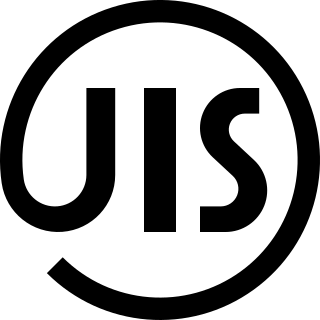 W
WJapanese Industrial Standards (JIS) are the standards used for industrial activities in Japan, coordinated by the Japanese Industrial Standards Committee (JISC) and published by the Japanese Standards Association (JSA). The JISC is composed of many nationwide committees and plays a vital role in standardizing activities across Japan.
 W
WThe Keymark is a voluntary European certification mark demonstrating compliance with the European Standard (EN). It is owned by CEN, the European Committee for Standardization, and CENELEC, the European Committee for Electrotechnical Standardization.
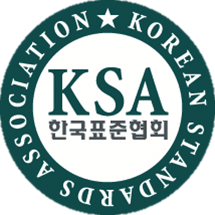 W
WKSA, formerly known as Korean Standards Association, is a public organization under South Korea's Ministry of Trade, Industry and Energy (MOTIE). KSA was established in 1962 pursuant to Article 32 of the Industrial Standardization Act.
 W
WThe Lion Mark is a British consumer symbol developed in 1988 by British Toy & Hobby Association (BTHA) and used to identify toys denoted as safe and of high quality.
 W
WThe Nordic Ecolabel or Nordic swan is the official sustainability ecolabel for products from the Nordic countries. It was introduced by the Nordic Council of Ministers in 1989. The logo is based on the logo of the Nordic Council adopted in 1984 which symbolises trust, integrity and freedom. The Nordic Swan covers 67 different product groups, from hand soap to furniture to hotels.
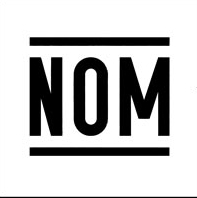 W
WThe Norma Oficial Mexicana, abbreviated NOM, is the name of each of a series of official, compulsory standards and regulations for diverse activities in Mexico. They are more commonly referred to as NOMs or normas.
 W
WNSF International is an American product testing, inspection and certification organization based in Ann Arbor, Michigan.
 W
WOrganic certification is a certification process for producers of organic food and other organic agricultural products. In general, any business directly involved in food production can be certified, including seed suppliers, farmers, food processors, retailers and restaurants. A lesser known counterpart is certification for organic textiles that includes certification of textile products made from organically grown fibres.
The QS mark is a Chinese quality and safety mark for food, beverages and other products. Introduced in 2003, it is managed by the General Administration of Quality Supervision, Inspection and Quarantine (GAQSIQ). The license is required for many product categories if they are both manufactured and sold in China. The mark was‘as deprecated in October 2018, and replaced with the SC system, which consists of the letters SC followed by a 14 digit number. SC means Sheng Chan (manufacturing) and the number is partially unique to each food processing facility. The first three digits represent the food category, the next two digits represent the province, the 6th and 7th digits represent the city, the 8th and 9th the district, the 10th to 13th are the sequence code for the production license, which is unique and has to be renewed every 5 years, and the last digit is the evaluation code. An example code is SC10532011500380, which means: 105: milk, 32: Jiangsu, 01: Nanjing, 15: Jiangning district, 0038: license number, and 0: evaluation code, Meaning that the product was made in the Jiangning district of Nanjing, Jiangsu province.
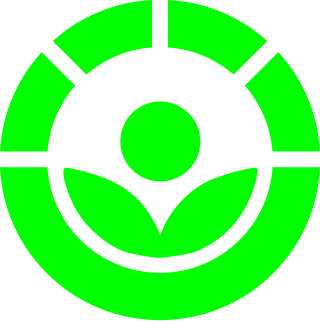 W
WThe Radura is the international symbol indicating a food product has been irradiated. The Radura is usually green and resembles a plant in circle. The top half of the circle is dashed. Graphical details and colours vary between countries.
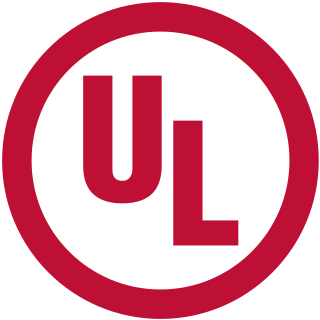 W
WUL, LLC is a global safety certification company headquartered in Northbrook, Illinois. It maintains offices in 46 countries. Established in 1894 as the Underwriters' Electrical Bureau, it was known throughout the 20th century as Underwriters Laboratories and participated in the safety analysis of many of that century's new technologies.
 W
WThe universal recycling symbol is internationally recognized for recycling activity.
 W
WAssured Food Standards is an organisation that promotes and regulates food quality in England, Northern Ireland and Wales. It licenses the Red Tractor quality mark, a product certification programme that comprises a number of farm assurance schemes for food products, animal feed and fertilizer. From 2018 onwards, the scheme gained increased media attention after hidden cameras filmed animal abuse happening at multiple Red Tractor assured farms.
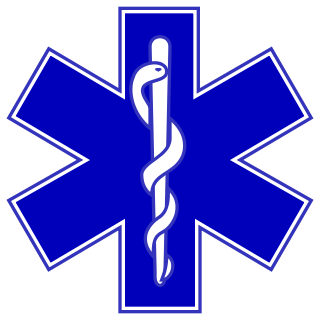 W
WThe Star of Life is a blue, six-pointed star, outlined with a white border and usually featuring the Rod of Asclepius in the center. The Star of Life symbol is currently governed by the U.S. National Highway Traffic Safety Administration (NHTSA) under the jurisdiction of the United States Department of Transportation (DOT), as holders of the copyright. It is now a recognized symbol of Emergency Medical Services in multiple countries.
 W
WThe State quality mark of the USSR was the official Soviet mark for the certification of quality established in 1967.
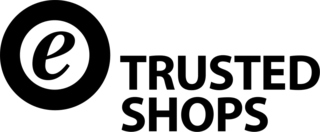 W
WTrusted Shops is a company founded in Cologne, Germany in 1999, which offers online shops and their customers trust-building services by means of a trustmark, a money-back guarantee process and a system of customer reviews. Online retailers are also provided with assistance in meeting legal requirements. Around 25,000 online shops display the trustmark as of July 2019.
 W
WUK Conformity Assessed (UKCA) marking is a certification mark that indicates conformity with the applicable requirements for products sold within Great Britain.
 W
WUL, LLC is a global safety certification company headquartered in Northbrook, Illinois. It maintains offices in 46 countries. Established in 1894 as the Underwriters' Electrical Bureau, it was known throughout the 20th century as Underwriters Laboratories and participated in the safety analysis of many of that century's new technologies.
 W
WA union label is a label, mark or emblem which advertises that the employees who make a product or provide a service are represented by the labor union or group of unions whose label appears, in order to attract customers who prefer to buy union-made products. The term "union bug" is frequently used to describe a minuscule union label appearing on printed materials, which supposedly resembles a small insect.
 W
WThe Vegan Awareness Foundation, also known as Vegan Action, is a 501(c)(3) non-profit organization in Virginia, United States and founded in 1995. Dedicated to helping animals, the environment, and human health by educating the public about the benefits of a vegan lifestyle and encouraging the spread of vegan food options through public outreach campaigns. One of the goals of Vegan Action is to create growth in the vegan marketplace and increase the availability of vegan products. They have introduced a logo to certify vegan products, vegan food options into schools nationwide, and ideas behind veganism.
 W
WA Warrant of Fitness (WoF) is an official New Zealand document certifying that a light motor vehicle has passed a compulsory periodic inspection of safety and roadworthiness. Most vehicles with a gross mass under 3,500 kilograms (7,700 lb) that are used on public roads are required to undergo a WoF test, with the frequency depending on the age of the vehicle. Since 1 January 2014, vehicles first registered on or after 1 January 2000 must undergo a WoF test annually; older vehicles must undergo a WoF test every six months. From 1 July 2014, vehicles first registered on or after 1 January 2000 must undergo a WoF test at first registration, at three years, and then annually after that; older vehicles must undergo a WoF test every six months.
 W
WThe Water Regulations Advisory Scheme (WRAS) is a conformance mark that demonstrates that an item complies with high standards set out by water regulations promulgated in 1999 in the United Kingdom.
 W
WWater Resistant is a common mark stamped on the back of wrist watches to indicate how well a watch is sealed against the ingress of water. It is usually accompanied by an indication of the static test pressure that a sample of newly manufactured watches were exposed to in a leakage test. The test pressure can be indicated either directly in units of pressure such as bar, atmospheres, or as an equivalent water depth in metres.